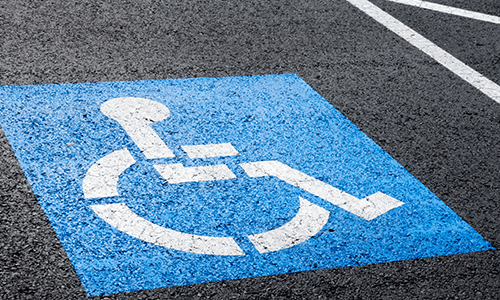As any Chicago resident with a motor vehicle knows, from the expensive park-per-day prices to the difficulty of parallel parking, owning a car in the city can sometimes be a nuisance and a burden. Even rightful owners of parking spaces in the city have faced some interesting challenges in more recent years.
One such issue is ownership of accessible spaces (or handicapped parking), which has caused some controversy in condominium properties. Per the Fair Housing Accessibility Guidelines, at least two percent of parking spaces in multi-family homes must be available to individuals with disabilities. Availability does not dictate ownership, however, so developers have historically sold accessible parking spots to non-disabled individuals after all non-accessible parking spots have been sold. This has proven to be a somewhat lucrative choice for developers, who can sell those spots at a premium, given their location and spatial convenience.
So what happens when non-disabled residents rightfully and legally own an accessible parking spot, and a handicapped individual comes to need a handicapped parking space of his own in that particular lot? Courts have been reluctant to create a bright-line rule on this issue. As seen in a few cases, courts are not willing to punish non-handicapped individual owners of accessible parking spots by forcing them out of their spaces. Instead, courts have looked not only to the developers who profited from the sale of the parking spots but to condominium associations with little to no real authority or capability to accommodate handicapped individuals. Suggestions have been made that condominium associations should somehow “take” physical space that does not belong to the association and re-designate for the benefit of the disabled owner such as redrawing parking lines to create an additional space where none existed or even forcing the sale of an accessible parking space from one rightful owner to a needing disabled owner.
So far, the courts have conveniently ignored this takings issue. If, as Americans, the Bill of Rights represents our core values, one must wonder, how can a court usurp private property for private use? The answer should be that the private parking space cannot be taken unless it is for “public use” and unless there is “just compensation,” per the Fifth Amendment Takings Clause.
The terms in the Takings Clause have been debated amongst courts for as long as the Clause has been in existence. What constitutes as “public use,” and how much compensation is “just compensation”? Courts have set many different answers to these questions. But whatever the answer, no court has indicated that forfeiture of private property to another individual for private benefit is either “public use” or that the taking of private property could be justly compensated, regardless of the fact that it may involve individuals with disabilities. In fact, it has been decided by many courts, many times over that taking private property for another’s private use, no matter the attempted justification, is a violation of the Takings Clause.
Further, the taking of a privately owned condominium parking space runs into other issues outside of constitutional rights. For example, though the Fair Housing Act (“FHA”) does exist to prohibit discrimination, it “does not create a right to an assigned handicapped space.” The FHA merely ensures that accessible spaces be created in the first place. The Illinois Human Rights Act (“IHRA”) outlines a similar definition of discrimination, and just like the FHA, the IHRA has no language indicating that a handicapped person is entitled to a handicapped space merely because one exists.
It is also important to note that residential facilities, i.e. condominiums, are not under the purview of “public accommodation” under the Americans with Disabilities Act (“ADA”). This helps to retain the private nature of condominiums, including their respective parking lots.
Given these parameters, courts would be left little room to justify taking one person’s parking space to give to another individual. However, condominium associations may still be liable for failing to accommodate handicapped persons in this regard. Though no owner can be forced to forfeit his parking space, the FHA defines discrimination as “refusal to permit, at the expense of the handicapped person, reasonable modifications of existing premises occupied…by such person if such modifications may be necessary to afford such person full enjoyment of the premises.” The question then turns to a matter of what a reasonable modification might be in matters of accessible parking.
Courts dealing with this issue have made a few suggestions with respect to accommodating handicapped individuals whilst keeping non-handicapped owners’ constitutional rights intact. The court in Jafri, for example, said that possible avenues to accommodate individuals with disabilities under these circumstances might include “reserving at least some accessible spaces for individuals with disabilities, including a clawback provision in the deeds for accessible spaces that were sold to individuals without disabilities, providing valet parking, or creating additional accessible parking with the parking spaces it retained or spaces that it could have repurchased.” The problem with the Jafri Court’s suggestions is that the Court failed to consider these suggestions in time and scope or expense. While a developer might take some of these suggestions to heart at the initial creation and selling stages of the project, an association cannot go back in time and change the restrictions in the initial deed. Further, the Jafri Court fails to address how an association would go about purchasing a parking unit or forcing an owner to sell a parking unit he did not want to sell. Lastly, a valet seems more in line with a modification rather than an accommodation as it requires an expenditure on the addition of a service rather than merely a change in policy. While it may be incumbent upon the association to allow the use of a private driver to drop off and pick up a disabled individual while parking or retrieving their vehicle, the cost of a valet service would be borne entirely by the disabled owner.
As this is a more recent problem, Courts haven’t held condominium associations liable yet, for the Developer’s sale of these accessible parking spots, but such sales “may be an FHA violation [by the Developer] if they are made without providing alternative means for making the building accessible.” While this statement was made in reference to a Developer’s sale of a parking space, associations are not in the clear. The court in Weiner went so far as to say, “condominium owners are required to take additional action to ensure that handicapped residents who require handicap parking space or other reasonable accommodation are, in fact, accommodated.” Because the Weiner Court was unable to provide any meaningful suggestion it conveniently left the unenviable task of formulating the remediation to the condominium association.
Though these options are highly problematic, opting for at least one alternative for handicapped individuals could save condominium associations a lot of hassle (and a lot of legal fees) in the future.
Authored by: Matthew J. Goldberg, Bancroft, Richman & Goldberg, LLC with assistance from Briana DeMaster
______________
(i) Final Fair Housing Accessibility Guidelines, 56 FR 9472-01.
(ii) Weiner v. Prairie Park Condo. Ass’n Inc., 16 C 1889, 2016 WL 3444210 (N.D. Ill. June 23, 2016)
(iii)Jafri v. Chandler LLC, 970 F.Supp.2d 852 (N.D. Ill. 2013)
(iv) U.S. Const. amend. V.
(v) Missouri Pac. Ry. Co. v. State of Nebraska, U.S.Neb.1896, 17 S.Ct. 130, 164 U.S. 403, 41 L.Ed. 489
(vi) Jankowski Lee & Assocs. V. Cisneros, 91 F.3d 891, 896 (7th Cir. 1996)
(vii) Gragg v. Park Ridge Mobile Home Court, LLP, 10-3313, 2011 WL 4459701 (C.D. Ill. Sept. 26, 2011)
(viii) 42 U.S.C.A. § 3604
(ix) See Jafri, 970 F.Supp.2d 852.
(x) See Jafri, 970 F.Supp.2d 852.
(xi) See Weiner, 2016 WL 3444210.
The comments and opinions expressed in this blog are of the individual author and may not reflect the opinions of CAI-Illinois.





 Fred Schroeder
Fred Schroeder 

 Margey Meyer
Margey Meyer 

